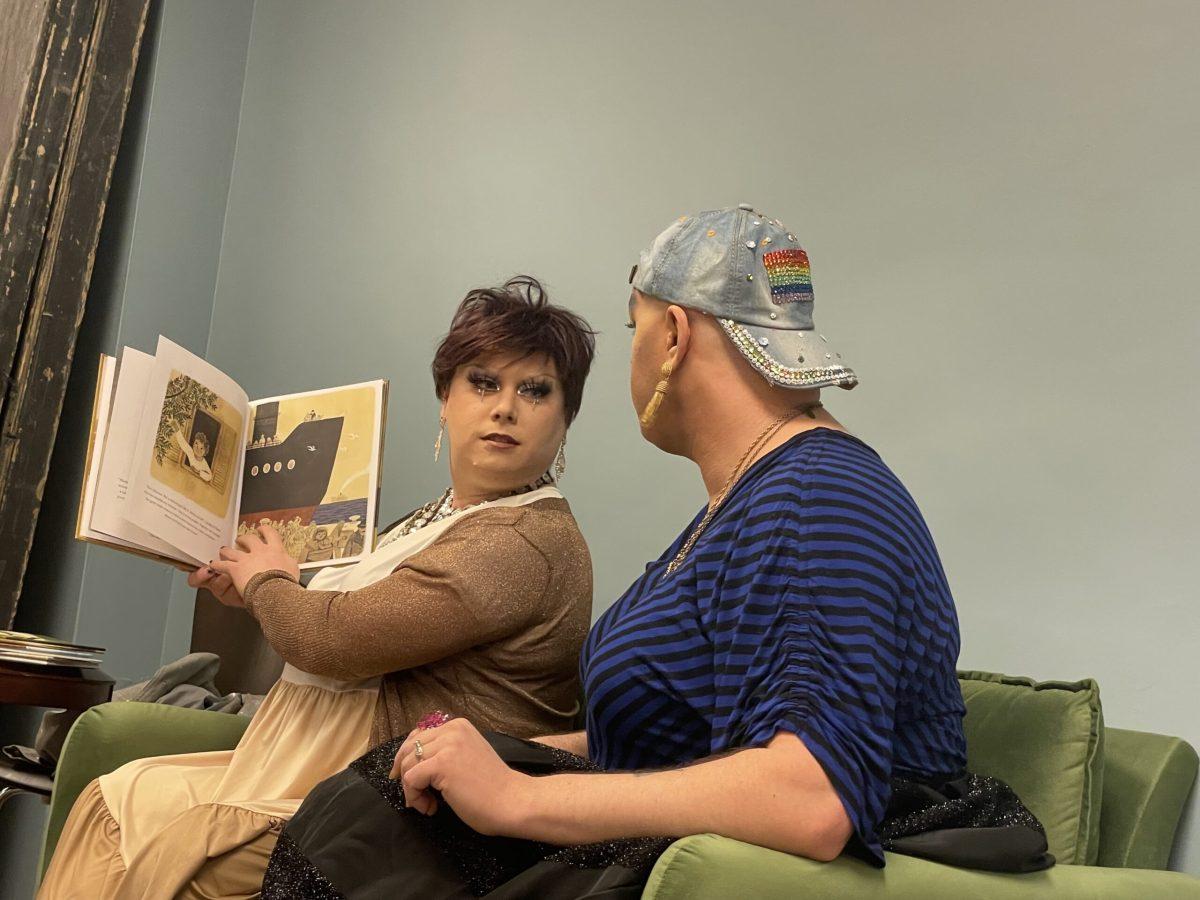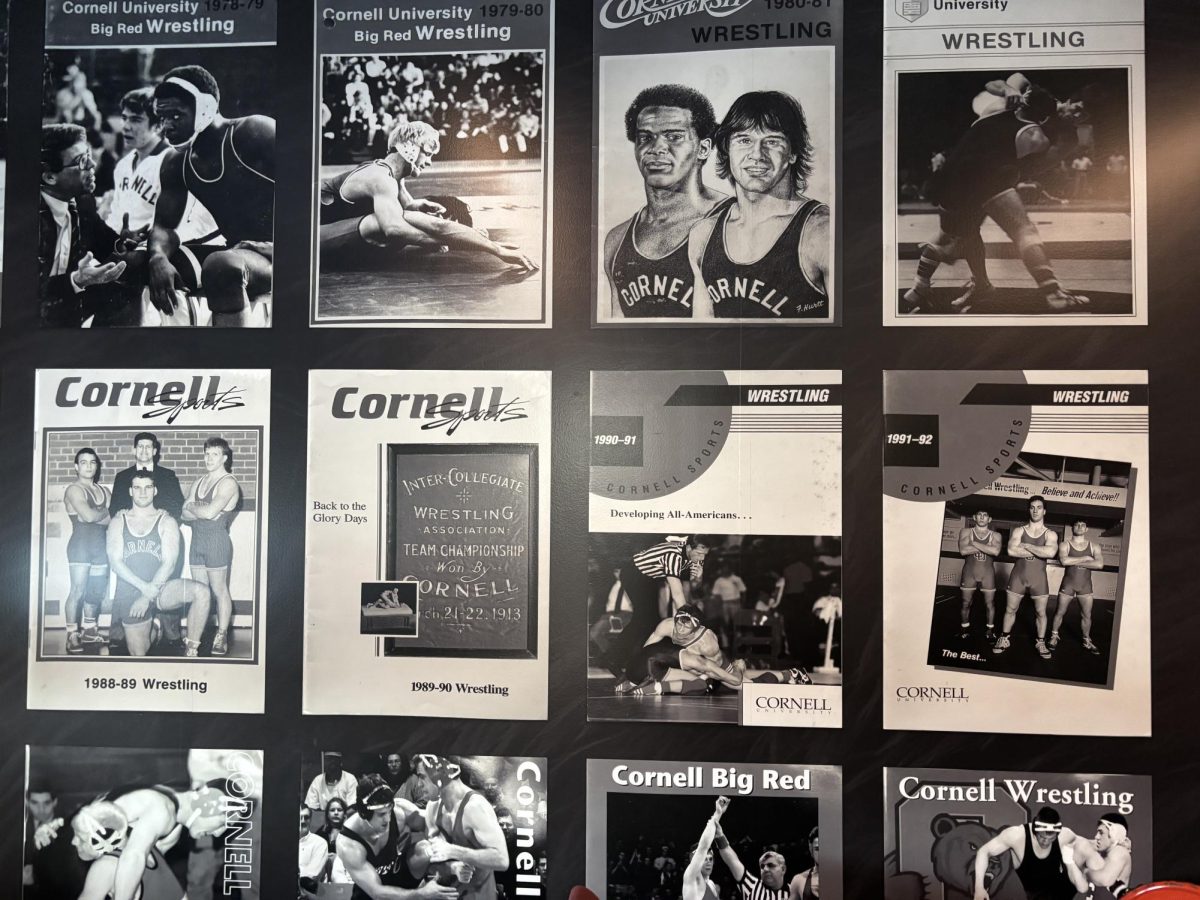On any given clear and chilly Saturday afternoon, Ithaca College’s campus is empty, with students either catching up on work or spending their free time off campus. With the Fall 2020 semester being remote, every day lends itself to an even more vacant campus.
However, on Nov. 14, a call-and-response broke the silence at the college’s main entrance.
“Open the books!” senior Tali Abraham, a member of Ithaca College Students for Labor Action (SLA), shouted into a megaphone. Behind them, a banner that stated, “Ithaca: Open the Books,” was draped over the college’s welcome sign.
“Open the books!” the crowd of approximately 100 protestors called back as cars drove down Route 96B, with drivers honking their horns in support.
SLA, a student organization that advocates for workers’ rights both on campus and in the Ithaca community, held the Rally to Open the Books in response to impending faculty, staff and program cuts at the college. The term #OpenTheBooks at Ithaca College was first coined earlier in November, when a coalition of faculty, staff, students and community members wrote an open letter that requested shared governance and financial transparency regarding the cuts. The letter now has over 760 signatures.
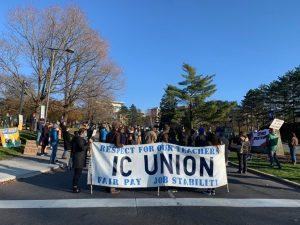
The faculty cuts at the college are associated with the Academic Program Prioritization (APP) process, which will determine the programs at the college that will be discontinued, consolidated, reorganized or grown. In October, La Jerne Cornish, provost and senior vice president for academic affairs, said that 131 full-time equivalent faculty positions at the college will be eliminated due to low enrollment. Additionally, 264 staff members have been impacted by furloughs, position eliminations or reductions in hours since March. The administration has stated that this downsizing has always been part of the college’s five-year strategic plan, Ithaca Forever.
One of Ithaca Forever’s goals states, “Determine and maintain an appropriate and sustainable size for our programs, structures, and associated resources at every level of the institution.” However, it never specified that this would mean a downsizing, nor did it specify the timeline in which this change would occur. Many protestors criticized the administration’s inflexibility to move away from or to alter the plan. The strategic plan was first introduced in 2018.
SLA’s concerns with the APP process include:
-
The college firing students’ mentors during the COVID-19 pandemic.
-
Students not having the opportunity to have a voice in the decision-making process through which programs, faculty and staff members get cut.
-
The college not being honest about its finances.
-
The APP process moving too quickly. Recommendations for which personnel and programs will be cut is set to be made by Dec. 31.
“The administration says that the decision to fire so many of our faculty and staff is for the students, that it’s student-centered,” Abraham said. “Well, as a student, I say, ‘No way.’ If you really centered students, you wouldn’t be firing our teachers, our mentors, our friends. If you really were centering students, you’d be including us in these decisions.”
Junior Julia Machlin, member of SLA and an organizer of the rally, said that she hopes the rally will convince members of the administration to listen to students’ dissatisfaction with the cuts and involve them in the decision-making process. The college has stated that in order to maintain a 12-to-1 student-faculty ratio, the college will only need 415 out of its 547 faculty members.
“This is going to impact everybody,” she said. “Students will have less time with their mentors and their professors because they will have to have larger classrooms. We really just want to play a part in this because it affects us.”
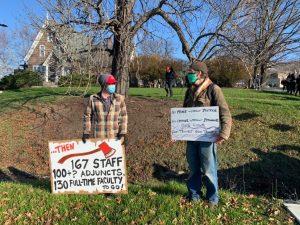
Speakers at the rally included members of SLA and faculty members from the college. No administrators were present at the event, which took place just steps away from the Peggy Ryan Williams Center, the college’s administrative building.
In response to the rally, Dave Maley, director of public relations, said that the college must maintain a sustainable size in order to maintain student access and affordability.
“Along with every other college and university in the country, Ithaca College has been financially impacted by the COVID-19 pandemic,” he said via email. “However, this work preceded the pandemic, and it will continue in alignment with our strategic plan across all roles, departments, and levels of the college. These are among the most challenging decisions any institution will face, but ignoring them is not an option. We will continue to take a student-centered approach, consistent with our stated vision, mission, and values, to ensure a strong and vibrant future for Ithaca College.”
As Maley said, Ithaca College is not alone in enacting drastic cuts. Since February, private education employment is down by 355,000 positions, according to the U.S. Bureau of Labor Statistics. Higher education has shed at least a tenth of the labor force it had before the start of the pandemic, according to the Chronicle of Higher Education. Pete Meyers, coordinator of the Tompkins County Workers’ Center, said that due to the economic impacts of the pandemic, the cuts are inevitable. However, the process in which they are conducted needs to be fair to faculty and staff.
“If the college keeps things the way they are … how are they not going to have to make cuts, depending on where the pandemic goes?” he said. “This is a tall order. That’s part of the problem with our larger society. Do the workers have any say in what’s going on?”
James Miranda, lecturer in the Department of Writing, shared with the crowd his concerns regarding the diminishing workforce.
“Leaving academia right now means leaving academia,” he said. “There are no jobs out there. Why won’t this administration invest in us? Are we worth investing in? Why are we divesting at a moment when we are at our most vulnerable?”
Patricia Rodriguez, associate professor and chair of the Department of Politics, said that her biggest concern is the administration making decisions without the input of the campus community. She said that she does not trust the administration to guide the college in the right direction.
“The climate at IC is not good,” she said. “I see IC in a state of despair and disregard. … I really think we have a chance to flip the script together. This is a time to scrutinize, to scrutinize this education model to demand change, to demand public discussions.”
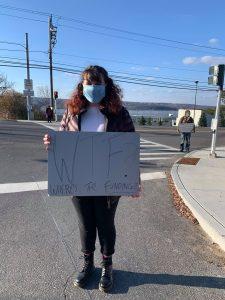
Senior Ray Volkin attended the rally to show support for faculty and staff members at the college.
“It doesn’t make any sense as to why we need to cut back so much on faculty when they’re the ones who made IC worth going to,” she said. “I don’t want to see the faculty I care about lose their jobs when we’re in the middle of a pandemic and there’s so many other factors in their lives.”
Junior Lauren Miller said she is doubting her degree and her investment in the college amid the cuts.
“I am very upset and really disheartened by all of the news that I’m hearing from my professors,” she said. “I am scared with them for the security of their jobs and their careers and their families as well. This is not a time for top-down change without consultation and active partnership with the students and with the staff and with members of our community.”
Junior Sebastian Chavez, Students of Color Coalition Senator for the Student Governance Council, said the rally presented an opportunity for those in the campus community to come together to demonstrate their concerns. He emphasized the importance of students coming to the forefront during this process.
“This really pinpoints how powerful Ithaca College can be,” he said. “It really shows … the heart and core is not just faculty and not just students. It’s everyone. This is an inclusive space, but in reality, it’s becoming exclusive. It’s frightening.”

Community members from beyond Ithaca College came to show their support at the rally, including Cornell University students. Risa Lieberwitz, general counsel of the American Association of University Professors and professor of labor and employment law in the Cornell University School of Industrial and Labor Relations, said she hopes the administration acknowledges that the college community is unsatisfied with the current campus climate.
“It’s cruel and disrespectful for the university to lay off faculty and staff without even the decency of sitting down with them and sharing information that’s being called for here,” she said. “This is a communal endeavor. … We have to stand together so university administrations cannot pit us against each other.”
Chavez said he hopes that students, faculty and staff can work together to enact change.
“Transparency is how we earn the trust and respect of our student community,” he said. “Being transparent is hard, and it’s messy. But sometimes we face the reality of the situation, and share the reality with our community because we deserve to know what’s going on at our college.”






